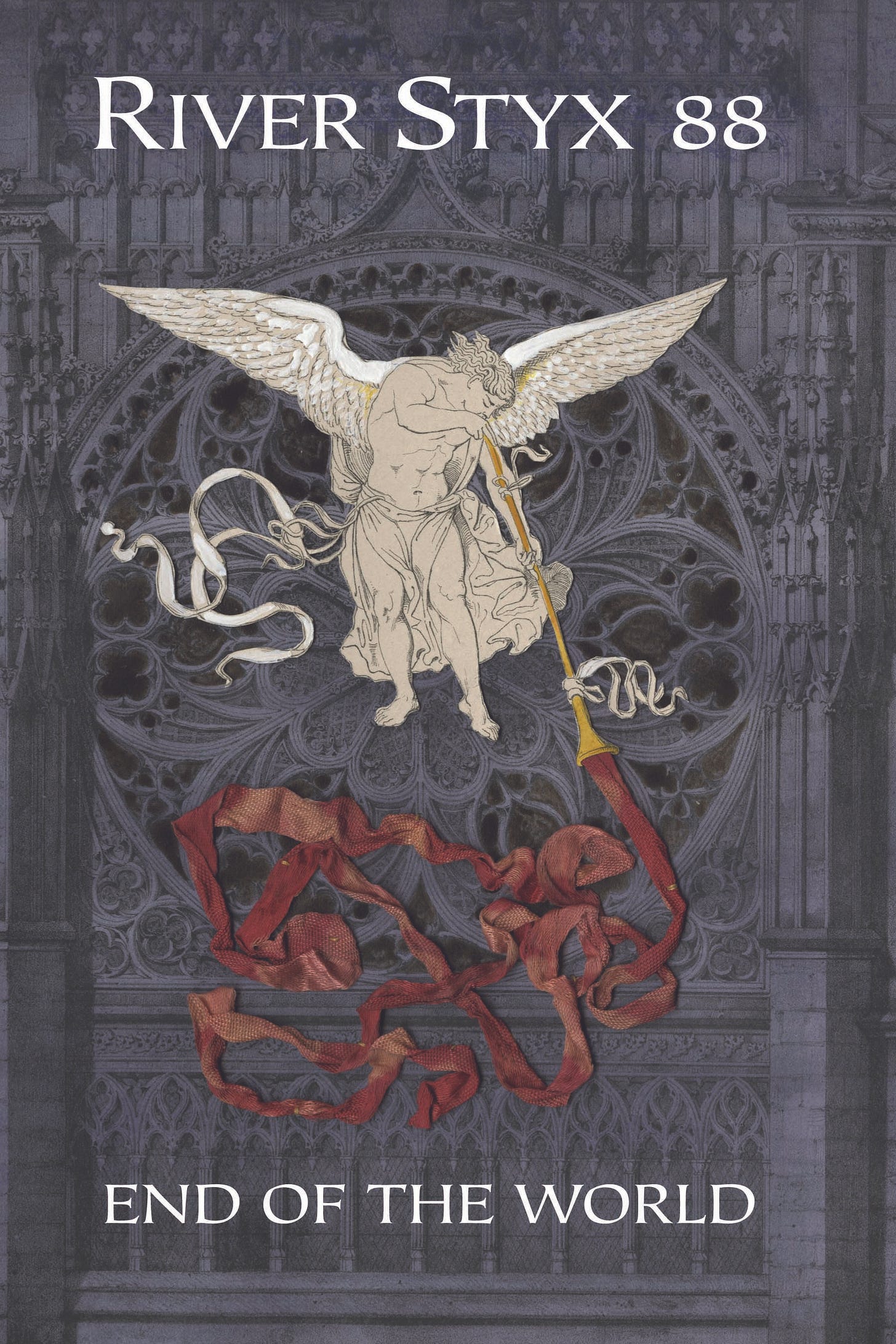Like a Lit Mag, Touched for the Very First Time!
Lit mags & lit institutions with CIA ties; McSweeneys' successful fundraising; Whiting Award winners; River Styx in peril; jobs at The Puritan, Solstice, Creative nonfiction; 30+ markets, and more
Welcome to the bi-weekly roundup of lit mag news.
Greetings Lit Magistrate,
Perhaps I’m alone in this, but I find the relationship between literature and state propaganda fascinating. If this interests you too, I encourage you to dive into the fascinating rabbit hole that is the history of The Paris Review. In Exclusive: The Paris Review, the Cold War and the CIA (from 2012), Joel Whitney writes,
The Paris Review has been hailed by Time magazine as the “biggest ‘little magazine’ in history.” …But as Peter Matthiessen, the magazine's founder, has told interviewers -- most recently at Penn State -- the journal also began as part of his CIA cover.
Many of the links in the above article no longer work. But for further reading you can check out Whitney’s 2016 interview with Tin House Editor Rob Spillman in BOMB or his book Finks: How the CIA tricked the World’s Best Writers, which explores how “the CIA had colluded with literary magazines to produce cultural propaganda throughout the Cold War.”
All of this came to my mind this week as I read Luke Beirne’s Counterpunch article, Canons of the Cold War: The Weaponization of Literature. Beirne goes into the relationship between the CIA and literary institutions that burgeoned mid-century, including the Iowa Writer’s Workshop. Much of this was exposed by Ramparts, a lit mag that operated from 1962-1975. He writes,
In 1967, Ramparts magazine revealed that the CCF [Congress of Cultural Freedom] was a CIA front. In 1999, Frances Stonor Saunders published Who Paid The Piper? The Cultural Cold War, outlining the vast network of cultural propaganda activities that the CCF carried out on behalf of the CIA from 1950 to 1979. A substantial body of work has since emerged demonstrating that the CCF was part of a campaign of cultural warfare intended to foster a sociopolitical environment conducive to the solidification and expansion of American dominance in the post-war world.
Beirne offers a fascinating glimpse into how literary institutions, literary magazines and even literary style itself can often be shaped by a myriad of forces.
Now, for something lighter, it’s always fun when little magazines get big press. This week, ABC news reports that McSweeney’s (which, if you remember, recently reclaimed its magazine The Believer), “has raised just over $300,000 — exceeding its goal by $25,000 — in the two months since announcing it was buying back…the acclaimed literary publication that nearly went out of business last year.”
In other happy news, The 2022 Whiting Prize Winners have been announced. The prizes “acknowledge, reward, and encourage organizations that actively nurture the writers who tell us, through their art, what is important.” Winners are Zyzzyva, Bennington Review, American Chordata, Electric Literature and Apogee. Congrats to these lovely little well-deserving magazines.
On a grimmer note, questions are being raised about St. Louis magazine River Styx. Several people in recent weeks have emailed me to inquire about this magazine, as production seems to have slowed. In Has St. Louis Literary Magazine River Styx Reached the End? Monica Obradovic writes,
River Styx published some of the nation's biggest writers, sometimes before their names were well known. Its contributors included U.S. poet laureates, Pulitzer Prize winners, National Book Award winners and Nobel laureates. River Styx also became known for its multiple reading series that drew world-renowned writers to St. Louis.
However, after more than 100 issues and 47 years, the River Styx seems to have lost its flow.
In recent years, the magazine's staff has continuously diminished. Grant funding has shrunk. And the pandemic forced the magazine to pause its long tradition of in-person readings.
River Styx, which at its most steady pace published three times a year, has not released an issue since early 2021. It has three people on its board of directors.
All this instability causes board president Deborah Taffa to worry about the magazine's future.
If all this doesn’t make you want to work for a lit mag, friends, I don’t know what will! Here are some jobs:
The Puritan is seeking a Nonfiction Editor.
Solstice: A Magazine for Diverse Voices is looking for a Managing Editor.
Applications are still open for Managing Editor of Conjunctions.
If you like to teach, Creative Nonfiction Magazine is “seeking instructors and curriculum designers for 5- and 10-week asynchronous online courses, webinars, and self-guided courses.”
Passengers is seeking “enthusiastic readers who want to be involved with sculpting our quarterly issues.”
If it is publishing opportunities you seek, then opportunities you shall have.
Trish Hopkinson, who announced a hiatus from her blogging recently, still maintains a Facebook page for No Fee Calls for Poems. The group is public.
Epiphany Journal has announced a Fresh Voices Fellowship. This is “a year-long fellowship supporting one emerging Black, Indigenous, Latinx, Asian, or other writer of color who does not have an MFA and is not currently enrolled in a degree-granting creative writing program.”
Authors Publish has posted 32 Magazines that Publish Flash Fiction and 5 Paying Literary Magazines to Submit to in July 2022.
As for us, we made it 4,000 subscribers last week! My enormous heartfelt Thank You to all of you who have been part of this project!


Also, big thanks to everyone who’s been participating in our weekend conversations about lit mags. It’s so fun getting to know you and your mag-tastic literary habits. In case you missed the last one, catch the latest here:
Finally, there will be a Submissions Q & A session this Sunday. Don’t miss the fun!
And that you beautiful belly breathers and profound pranayama practitioners, you summertime summoners of sacred secrets and you surly sourpusses chugging along with your chakras in total mishigas, you with your third eye opening to the splendor of the divine something or other, you at the start of a spectacular stretch of silly-sweet epiphanies, you whose daily writing brings you face to face with an exhaustingly infinite number of possibilities, you standing up, you sitting down, you crawling across a forgiveness-soaked sea (or at least begging for one), you with sun in your eyes and wisdom in your bounce-stepping heart, and you out there, who is everywhere at once these days, really just basically overwhelmed and also honestly? craving a glass of you don’t even know what, honeysuckle sauce, stevia-dipped seaweed, or maybe just, truly? the simplicity of stars, is the news in literary magazines.
Have glorious week, pals.
Fondly,
Becky
Got a question, comment, idea, lonely heart, destination vacation, favorite recipe or best American short suggestion?






This is such a fascinating roundup that I am tweeting it in a couple of days. It bears our attention that the Iowa Writers Workshop (which now has its literary translation sister organization) and the Paris Review are still fat and happy organizations. It is an important reminder that there are a myriad of factors, many political, that go into who is deemed "the best" and who wins the big prizes. One cannot help but wonder if such programs continue (I'm sure they do) and who they are supporting now?
Eric Bennett’s “Workshops of Empire” delves into the development of the Workshops, in particular Paul Engle (who mentored Flannery O’Connor at Iowa) and Wallace Stegner (Stanford) who shaped many soldier writers. Loosely (very loosely) these founders believed the postwar development of the writers’ workshops and through teaching the model to future generations of MFA writers and teachers to future students, war could be avoided through international cultural exchange, as in it’s difficult to war with countries that share mutual admiration for the arts. Or at least, this was an initial premise.
“Through these efforts, Engle brought in money from the Rockefeller Foundation, The State Department, and CIA front groups the Farfield Foundation and the Asia Foundation.
These organizations were giving money to Iowa at the same time that the CIA was funding literary magazines worldwide through the Congress for Cultural Freedom.”
https://www.currentaffairs.org/2022/04/how-creative-writing-programs-de-politicized-fiction